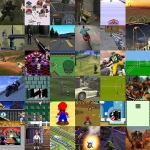Articles tagged with: GBL

It’s an exciting time to be an educational game designer. With the explosion in popularity of gamification and game based learning, there is a lot of interest in any and all titles that are aimed at the educational market. Many companies have stepped up and are providing fun games and apps that make learning more engaging for kids, focusing on everything from pre-reading and literacy skills, to science and math, and even art appreciation. The field has never felt so wide open.
And yet, as I play many of these well …

The explosive growth in video gaming has brought some positive attention to the power of video games to engage kids and also to teach. As with anything in life, there is the risk of playing too much, playing the wrong kind of games, and even of addiction. It is the fear of addiction and other negative effects of video games that have some calling for restraints on all video game usage.

This post is based on an email correspondence with a colleague; it became an interesting discussion so I turned it into a blog post.
What do you find meaningful about the emphasis on fun in games?
I think the power of “fun” to create engagement in learning can’t be underestimated. Marc Prensky describes a certain game that detects player decision-making and makes the game harder for them. Despite being more frustrating, players keep playing and try to overcome the limitations they are given. “Fun” doesn’t mean avoiding challenges, in fact when it …
Perhaps the relationship between game playing and effective learning can be thought of in terms of Vygotsky’s concept of Zone of Proximal Development (Schunk, 1999). Vygotsky wrote that children learn best when they are challenged by situations they are developmentally ready to handle, but do not yet have the skills to master. They develop these skills through interaction with others, exploring the environment, knowing what they are trying to accomplish, being able to modify the environment, and getting corrective feedback from the environment. These characteristics of a learning environment correlate …
Goals – Activities – Mechanics – Environment
Environment
Design a game environment (game world) that support the chosen mechanics, provides engaging gameplay scenarios, and supports a game narrative that places the learning content within the game context.
Although this is the last step that I’m discussing, it is certainly not the least important. This is where all the previous steps come together in a satisfying way. In this step, the designer creates an overarching framework for all the content that’s been outlined in the previous steps.
Context is important in learning – people tend …
Goals – Activities – Mechanics – Environment
Mechanics
Choose gameplay mechanics that allow the player to perform the game activities. There should be enough different mechanics to keep gameplay from becoming repetitive, but not too many that they’re hard to keep track of. Players should be spending time learning the game content, not how to play the game.
“Mechanics” is a term that can be defined in many different ways in different contexts – especially when differentiating between digital and non-digital games (Rogers, 2010). However, for this discussion it refers to the …




 A passion for creating educational multimedia, especially digital games. Fascinated by the challenge of integrating gameplay mechanics with educational content to create a true intrinsic learning experience. Interested in technology and special ed, digital storytelling, and science education. Closet science geek (shhh!!!)
A passion for creating educational multimedia, especially digital games. Fascinated by the challenge of integrating gameplay mechanics with educational content to create a true intrinsic learning experience. Interested in technology and special ed, digital storytelling, and science education. Closet science geek (shhh!!!)